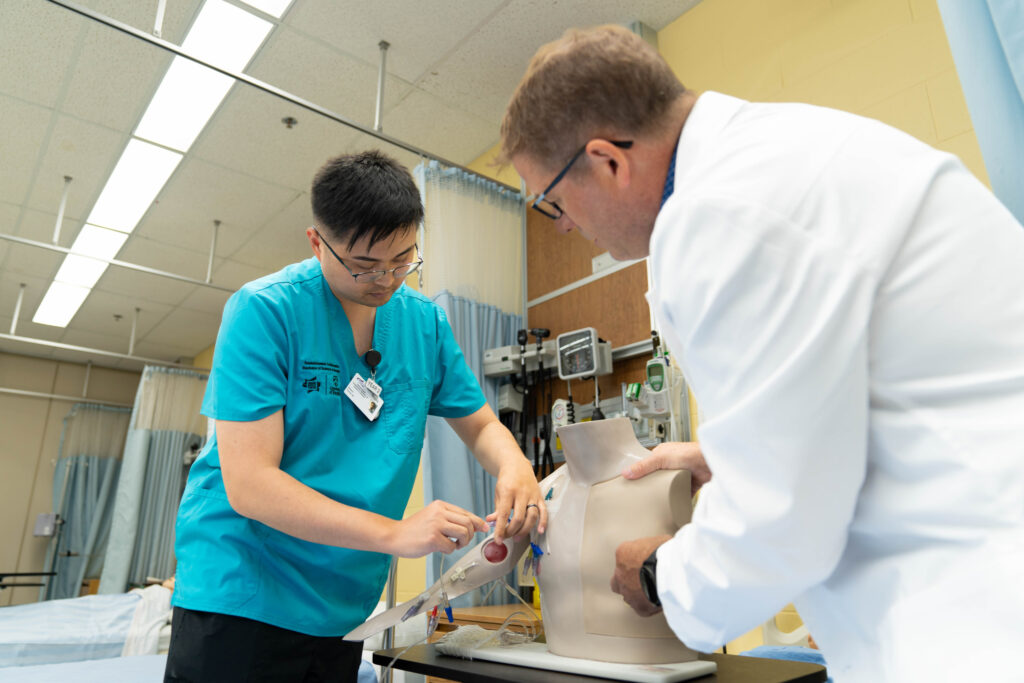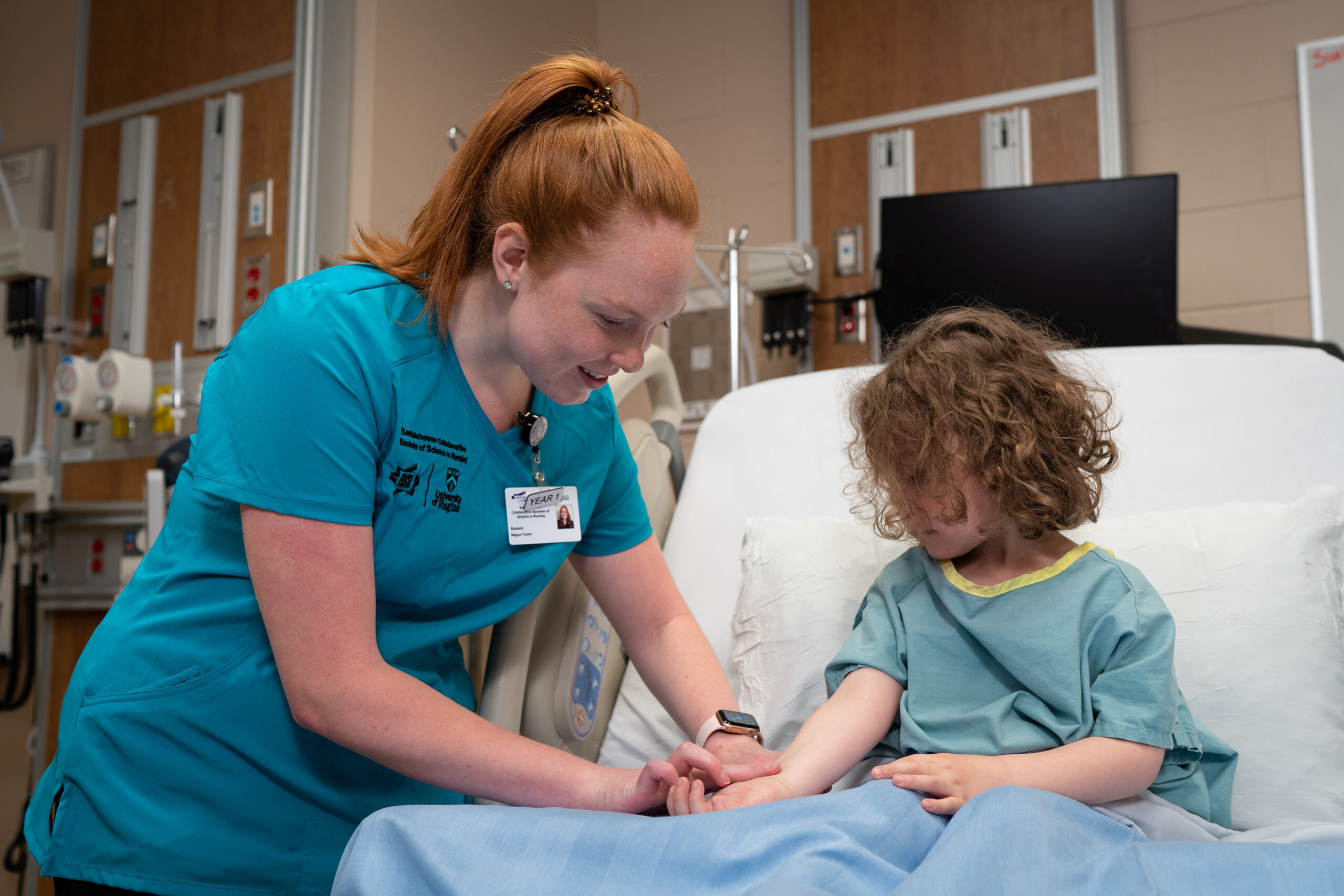Important Date
Applications for the 4-year bilingual option extended until May 31, 2025 for the fall 2025 intake (domestic applicants only).
Overview of the Saskatchewan Collaborative Bachelor of Science in Nursing (SCBScN) Program
The University of Regina and Saskatchewan Polytechnic jointly offer the Saskatchewan Collaborative Bachelor of Science in Nursing (SCBScN).
As a student in the SCBScN program you will begin your nursing education in Year 1 with opportunities to work directly with patients and clients.
The SCBScN program includes eight semesters of course work. The program is designed for full-time study.
SCBScN is accredited by the Canadian Association of Schools of Nursing (CASN). This means that your nursing program meets national standards of excellence in nursing education.
SCBScN Prospective Information Sheet (330 KB – pdf)
SCBScN Bilingual Prospective Information Sheet (443 KB – pdf)
More Program Details
Other Program and Pathways
In addition to the standard program the SCBScN has the following options for qualifying students:
Bilingual Option
Join the only bilingual nursing program in Saskatchewan and complete half your degree in English and half in French.
After Degree Nursing Program (ADNP)
The ADNP provides applicants who hold a degree in another field to complete the Saskatchewan Collaborative Bachelor of Science in Nursing (SCBScN) program.
Upper Year Admission
Applicants must apply to the SCBScN program through the Upper Year admission route if they have completed 9 credit hours or more of nursing courses at a recognized Canadian post-secondary institution
LPN to BScN Pathway
The LPN to BScN pathway is designed for Practical Nurses currently registered within Saskatchewan.
Completion Options
There are three exit options for students enrolled in the SCBScN program. Applications for the early exits (December and August) are completed after a student is accepted to the program and meets the early exit requirements.
Students interested in pursuing the August Exit option or the December Exit option are required to apply. Applications for these completion options are made available to students in December each year. Further details and information sessions are posted to the SCBScN Student Cohort for current students.
4 Year April Exit option (Default for Regina and Saskatoon)
The April Exit option is the program default for students admitted to the four-year program. This route entails full-time programming in the fall and winter terms, with the spring/summers off. Students complete their program in four calendar years.
3.5 Year December Exit option
This route entails full-time programming in the fall, winter, and spring/summer terms following the completion of 300-level courses. Students interested in the December Exit will receive more information once admitted to the SCBScN program.
3 Year August Exit option (Default for After Degree Nursing Program)
This route entails full-time programming in the fall, winter, and spring/summer terms following the completion of 200-level courses. Students interested in the August Exit will receive more information once admitted to the SCBScN program.
Students admitted to the After Degree Program are automatically enrolled in the August Exit as part of their program. After Degree Nursing Students complete their program in two calendar years.
Note for Student Athletes
It is recommended that student athletes reduce their course load and consider completing their program in more than four years. The schedule for a student attending with a full course load provides little or no flexibility needed for athletics. There is no provision for class, lab or clinical experiences to be made up. Student athletes are advised to speak with an Academic Advisor to discuss a program of studies that will meet their athletic schedule.
Physical Demands of the Program
Nursing is a physically demanding profession. If you are accepted into the Saskatchewan Collaborative Bachelor of Science in Nursing program, you will be required to participate in all aspects of the program. You will engage in clinical practice that involves physically strenuous activity such as repetitive lifting and bending, walking and standing over extended periods, and fine motor coordination. For more information on the skills and abilities of a registered nurse, please refer to the College of Registered Nurses of Saskatchewan’s Becoming a Registered Nurse in Saskatchewan: Requisite Skills and Abilities (222 KB – PDF).

Cut-off Averages
As the Saskatchewan Collaborative Bachelor of Science in Nursing is a competitive-entry programs, applicants often require a higher average than the minimum average required for admission. Please see previous year’s cut-off averages below based on applicants and capacity.
| Fall 2023 | ||||
| Application Type | Seats Available | Applicants | Minimum Average Required | Averages Accepted |
| 4-year Program | 366 | 914 | High School: 70% (in each course) Post-Secondary: 65% |
High School: 77.4%+ Post-Secondary: 65.30%+ |
| Fall 2022 | ||||
| Application Type | Seats Available | Applicants | Minimum Average Required | Averages Accepted |
| 4-year Program | 355 | 1004 | High School: 70% (in each course) Post-Secondary: 65% |
High School: 83%+ Post-Secondary: 70.1%+ |
Additional Information & Frequently Asked Questions
English Language Proficiency (ELP) Requirements
The language of instruction at the University of Regina is English. All applicants to the University of Regina must therefore demonstrate an appropriate level of proficiency in the English language. Any one of the following will be accepted as satisfactory evidence:
- Successful completion of at least three years of formal, full-time English at a secondary school that is a recognized school or institution where English is primary language of instruction.
- Successful completion of the English as a Second Language (Advanced EAP) program or a minimum average score of 55 on the ESL placement exam both offered through the Centre for Continuing Education at the University of Regina. For further information, please contact English as a Second Language Office, Room 114, South Residence, University of Regina, Regina, SK, S4S 0A2, Tel: (306) 585-4585 or esl@uregina.ca.
- Successful completion of at least 24 credit hours (University of Regina degree level equivalent) in an approved English-language post-secondary institution, including at least 6 credit hours in humanities or social science subjects and with a minimum grade point average of 60.00% or equivalent is considered an acceptable demonstration of proficiency in English. Post-secondary institutions that meet this requirement must be verified by the University of Regina using industry-recognized higher education resources.
-
- For the Faculty of Nursing, post-secondary studies from a country where education at the post-secondary or secondary level is not commonly delivered in English, those studies must have been completed within two (2) years of application to the Faculty in order to meet English Language proficiency. Refer to the English Language Proficiency List by Country.
-
- Advanced Placement English (grade of 3 or better) or International Baccalaureate Higher English (grade of 4 or better) or SAT II English (required score varies).
- GCSE/IGCSE/GCE O’ Level English, English Language, or English as a Second Language with minimum grade of ‘B’ or GCE A/AS/AICE Level English or English Language with minimum grade of ‘C’.
- Completion of the IELTS (Academic) exam with the following minimum scores in each category:
- Overall score of 7.0
- Speaking 7.0
- Writing 6.5
- Listening 7.0
- Reading 6.5
International applicants on a study permit can apply to this program. The University of Regina and Saskatchewan Polytechnic have extensive services in place for international students. There are 5 seats in the program for international students in year one. Like all other applicants, International applicants must meet admission requirements. International students must be in their accepted site by August 15. Upon acceptance into the SCBScN program, international students should start the process to obtain a criminal record check in their home country. A completed criminal record check must be submitted prior to the start of classes in their first term.
International students on study permit are required to apply for a co-op work permit upon admission. The SCBScN program includes clinical/practicum course placements, where a co-op work permit is required. Once admitted to the program, international students will be supplied with a co-op work permit letter. This must be submitted to Immigration, Refugees, and Citizenship Canada (IRCC) along with the application for a co-op work permit.
Unfilled designated seats will become available to other applicants.
If an applicant has attended another approved post-secondary institution, they may be eligible for transfer credit. Transfer credit will only be assessed after a student is admitted to the program. If the post-secondary institution is not declared on the application for admission, it will not eligible for transfer credit and admission may be revoked.
Applicants who have completed Advanced Placement (AP) courses or International Baccalaureate (BI) courses may also be eligible for transfer credit. Minimum grades are required and can be found under General Information on the Transfer Credit website noted below.
